Latest Sheet Music
Grigor Iliev
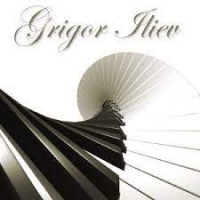
Grigor Iliev is a Bulgarian composer born in Sandanski, Bulgaria. At the age of 15 he began playing guitar. Two months latter he started playing piano and soon the piano becomes his favorite instrument.At the age of 21 he suspended his musical initiatives and began studying computer science. He received a bachelor's degree in Informatics from South-West University "Neofit Rilski" and was assigned as an assistant professor in the Computer Science department of the same university. Being a follower of the open source idea, in 2005 he joined the development of the LinuxSampler project, working mainly on the creation of platform-independent frontend for LinuxSampler.
Richard Kearns
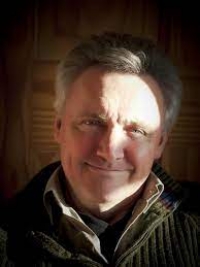
He was born in 1952 at North Gloucester Place, Dublin, Ireland. He died in 2014.
Stephen Flaherty

Stephen Flaherty (born September 18, 1960) is an American composer of musical theatre. He works most often in collaboration with the lyricist/bookwriter Lynn Ahrens. They are best known for writing the Broadway shows Once on This Island, which was nominated for eight Tony Awards, Seussical , which was nominated for the Grammy Award and Ragtime, which was nominated for twelve Tony Awards and won Best Original Score. Flaherty was also nominated for two Academy Awards and two Golden Globe Awards with Lynn Ahrens for his songs and song score for the animated film musical Anastasia.
The Carpenters
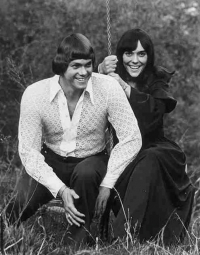
The Carpenters were a vocal and instrumental duo, consisting of siblings Karen and Richard Carpenter. Though often referred to by the public as "The Carpenters", the duo's official name on authorized recordings and press materials is simply "Carpenters", without the definite article. During a period in the 1970s when louder and wilder rock was in great demand, Richard and Karen produced a distinctively soft musical style that made them one of the best-selling music artists of all time.
The Carpenters' melodic pop charted a record-breaking score of hit recordings on the American Top 40 and Adult Contemporary charts, becoming leading sellers in the soft rock, easy listening and adult contemporary genres. The Carpenters had three #1 singles on the Billboard Hot 100 and fifteen #1 hits on the Adult Contemporary Chart (see The Carpenters discography). In addition, they had twelve top 10 singles (including their #1 hits). To date, The Carpenters' album and single sales total more than 100 million units.
During their fourteen-year career, The Carpenters recorded eleven albums, five of which contained top 10 singles (Close to You, Carpenters, A Song for You, Now & Then and Horizon), thirty-one singles, five television specials, and one short-lived television series. They toured in the United States, the United Kingdom, Japan, Australia, the Netherlands and Belgium. Their recording career ended with Karen's death on February 4, 1983. Karen passed away due to a cardiac arrest due to complications of anorexia nervosa. Extensive news coverage of the circumstances surrounding her death increased public awareness of the consequences of eating disorders.
The Carpenters' melodic pop charted a record-breaking score of hit recordings on the American Top 40 and Adult Contemporary charts, becoming leading sellers in the soft rock, easy listening and adult contemporary genres. The Carpenters had three #1 singles on the Billboard Hot 100 and fifteen #1 hits on the Adult Contemporary Chart (see The Carpenters discography). In addition, they had twelve top 10 singles (including their #1 hits). To date, The Carpenters' album and single sales total more than 100 million units.
During their fourteen-year career, The Carpenters recorded eleven albums, five of which contained top 10 singles (Close to You, Carpenters, A Song for You, Now & Then and Horizon), thirty-one singles, five television specials, and one short-lived television series. They toured in the United States, the United Kingdom, Japan, Australia, the Netherlands and Belgium. Their recording career ended with Karen's death on February 4, 1983. Karen passed away due to a cardiac arrest due to complications of anorexia nervosa. Extensive news coverage of the circumstances surrounding her death increased public awareness of the consequences of eating disorders.
Rossini

Gioachino Antonio Rossini (February 29, 1792 – November 13, 1868) was a popular Italian composer who created 39 operas as well as sacred music and chamber music. His best known works include Il barbiere di Siviglia (The Barber of Seville), La Cenerentola and Guillaume Tell (William Tell).
Rossini's most famous opera was produced on February 20, 1816 at the Teatro Argentina in Rome. The libretto by Cesare Sterbini, a version of Pierre Beaumarchais' infamous stage play Le Barbier de Séville, was the same as that already used by Giovanni Paisiello in his own Barbiere, an opera which had enjoyed European popularity for more than a quarter of a century. Much is made of how fast Rossini's opera was written, scholarship generally agreeing upon two weeks. Later in life, Rossini claimed to have written the opera in only twelve days. It was a colossal failure when it premiered as Almaviva; Paisiello’s admirers were extremely indignant, sabotaging the production by whistling and shouting during the entire first act. However, not long after the second performance, the opera became so successful that the fame of Paisiello's opera was transferred to Rossini's, to which the title The Barber of Seville passed as an inalienable heritage.
Rossini's most famous opera was produced on February 20, 1816 at the Teatro Argentina in Rome. The libretto by Cesare Sterbini, a version of Pierre Beaumarchais' infamous stage play Le Barbier de Séville, was the same as that already used by Giovanni Paisiello in his own Barbiere, an opera which had enjoyed European popularity for more than a quarter of a century. Much is made of how fast Rossini's opera was written, scholarship generally agreeing upon two weeks. Later in life, Rossini claimed to have written the opera in only twelve days. It was a colossal failure when it premiered as Almaviva; Paisiello’s admirers were extremely indignant, sabotaging the production by whistling and shouting during the entire first act. However, not long after the second performance, the opera became so successful that the fame of Paisiello's opera was transferred to Rossini's, to which the title The Barber of Seville passed as an inalienable heritage.
Aqua

Aqua is a Danish dance-pop group, perhaps best known for their 1997 breakthrough single "Barbie Girl". The group formed in 1989, and achieved huge success across the globe in the late 1990s and early 2000s. The group managed to top the UK Singles Chart with their first three singles, a feat few artists have achieved. The group released two albums: Aquarium in 1997 and Aquarius in 2000, before splitting up in July 2001. The group sold an estimated 30 million albums and singles, making them the most successful Danish band ever. The band was formed by Lene Nystrøm Rasted (vocals), Rene Dif (vocals), Søren Rasted (keyboard) and Claus Norreen (guitar).
In their prime, Aqua's singles managed to chart top ten in a number of countries where European pop acts would not normally succeed, including the United States, Australia, and Japan. The group also caused controversy with the double entendres in their "Barbie Girl" single, with the Barbie doll makers Mattel filing a lawsuit against the group. The lawsuit was finally rejected in 2002.
Since their 2001 split, Nystrøm, Dif and Rasted have all achieved solo chart success, and Norreen has continued in the music industry remixing other artists' material.
The group has announced the upcoming release of a compilation album featuring new material, and the four original members have confirmed Aqua will reunite for a tour in 2008. This was confirmed at a press event Friday on October 26, 2007.
In their prime, Aqua's singles managed to chart top ten in a number of countries where European pop acts would not normally succeed, including the United States, Australia, and Japan. The group also caused controversy with the double entendres in their "Barbie Girl" single, with the Barbie doll makers Mattel filing a lawsuit against the group. The lawsuit was finally rejected in 2002.
Since their 2001 split, Nystrøm, Dif and Rasted have all achieved solo chart success, and Norreen has continued in the music industry remixing other artists' material.
The group has announced the upcoming release of a compilation album featuring new material, and the four original members have confirmed Aqua will reunite for a tour in 2008. This was confirmed at a press event Friday on October 26, 2007.
Joseph Kosma

Joseph Kosma was a Hungarian-French composer. Date of birth: October 22, 1905, Budapest, Hungary Date and place of death: August 7, 1969, France
Kenny Burrell
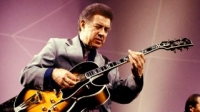
Kenneth Earl Burrell (born July 31, 1931) is an American jazz guitarist known for his work on the Blue Note label. His collaborations with Jimmy Smith produced the 1965 Billboard Top Twenty hit album Organ Grinder Swing. He has cited jazz guitarists Charlie Christian and Django Reinhardt as influences, along with blues guitarists T-Bone Walker and Muddy Waters. Furthermore, Jimi Hendrix, Stevie Ray Vaughan and Peter Frampton have cited Burrell as an influence.
Burrell is a professor and Director of Jazz Studies at the UCLA Herb Alpert School of Music.
Burrell is a professor and Director of Jazz Studies at the UCLA Herb Alpert School of Music.
Mel Bonis
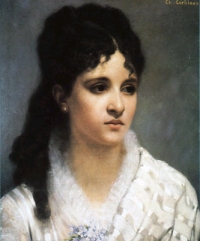
Mélanie Hélène Bonis, known as Mel Bonis (21 January 1858 – 18 March 1937), was a prolific French late-Romantic composer. She wrote more than 300 pieces, including works for piano solo and four hands, organ pieces, chamber music, mélodies, choral music, a mass, and works for orchestra. She attended the Paris Conservatoire, where her teachers included Cesar Franck, Ernest Guiraud, and Auguste Bazille.
George L. Cobb
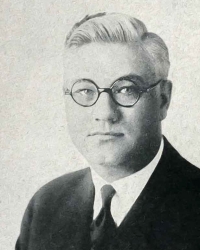
George Linus Cobb (August 31, 1886 – December 25, 1942) was an American composer. He composed over 200 pieces of music, including ragtimes, marches, and waltzes. He also wrote columns for music trade publicationsCobb attended the School of Harmony and Composition at Syracuse University in 1905, and his compositions began soon thereafter.Cobb collaborated with lyricist Jack Yellen on many early songs, and in 1950 Billboard described Cobb as a "roving music teacher" during Yellen's sophomore year in college. They sold their first big hit, All Aboard for Dixieland, for $100 in 1913, but the two had been writing songs as early as 1909, beginning with Moonlight Makes Me Lonesome For A Girl Like You.
Emilio Chamorro
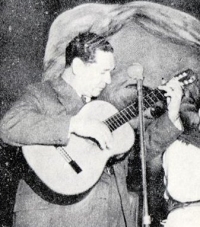
Emilio Chamorro, el Tata, a veces con el seudónimo de Emilio del Campo (1904-1971), fue un conocido músico y guitarrista, considerado como uno de los pioneros del chamamé y la música litoraleña, de Argentina. En 1931 formó el primer conjunto famoso de chamamé, llamado Los Hijos de Corrientes, considerado como una "escuela chamamecera",1 integrado por músicos que luego serían famosos como Tránsito Cocomarola, Isaco Abitbol, Tarragó Ros, Ernesto Montiel y muchos otros. Entre 1944 y 1945 estableció en la ciudad de Rosario el "boliche" bailable La Ranchada,2 que se constituyó en el centro más importante de difusión del chamamé. Entre sus canciones exitosas se destacan "San Luis", "Taragüí rapé" y "Lamento correntino".
Nhac Viet

Traditional Vietnamese music encompasses a large umbrella of Vietnamese music from antiquity to present times, and can also encompass multiple groups, such as those from Vietnam's ethnic minority tribes
Richard Genée
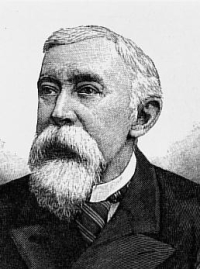
Franz Friedrich Richard Genée (7 February 1823 – 15 June 1895) was a Prussian born Austrian librettist, playwright, and composer.He is most famous for the libretto of Die Fledermaus, Johann Strauss II's most famous operetta. He co-wrote the libretto without having met top-billed librettist Karl Haffner, who constructed the new story based on a play by Henri Meilhac and Ludovic Halévy, which was considered too shocking to perform outside Paris. Genée, however, wrote the operetta's actual text and drew nothing from Haffner beyond the names of the characters. One of his best-known works was the libretto of Karl Millöcker's operetta Der Bettelstudent, which he co-wrote with Friedrich Zell (the pseudonym of Camillo Walzel). He also wrote the libretto to Ella Adayevskaya's 1877 opera Zarya. In 1857 he was conductor of the philharmonic orchestra In Mainz.
Yoko Kanno

Yoko Kanno (菅野 よう子 Kanno Yōko?, born March 19, 1964 in Miyagi Prefecture, Japan) is a composer, arranger and musician best known for her work on the soundtracks for many games, anime films, TV series, live-action movies, and advertisements. She has written scores for famous animated works, including Macross Plus, Turn A Gundam, Cowboy Bebop, The Vision of Escaflowne, Ghost in the Shell: Stand Alone Complex, Wolf's Rain, and is the most trusted composer by veteran and new-wave directors such as Yoshiyuki Tomino, Shinichiro Watanabe and Shoji Kawamori. Kanno has also composed music for J-pop artists, the most notable being Maaya Sakamoto and Kyōko Koizumi. She is also a skilled keyboardist, and is the frontwoman for The Seatbelts, who perform many of Kanno's compositions on the various original soundtracks for which she is responsible.
Erik Satie

Éric Alfred Leslie Satie, who signed his name Erik Satie after 1884, was a French composer and pianist. Satie was an influential artist in the late 19th- and early 20th-century Parisian avant-garde.
Ravel

Joseph-Maurice Ravel (March 7, 1875 – December 28, 1937) was a French composer of Impressionist music known especially for his melodies, orchestral and instrumental textures and effects. Much of his piano music, chamber music, vocal music and orchestral music has entered the standard concert repertoire.
Ravel's piano compositions, such as Jeux d'eau, Miroirs and Gaspard de la Nuit, demand considerable virtuosity from the performer, and his orchestral music, including Daphnis et Chloé and his arrangement of Modest Mussorgsky's Pictures at an Exhibition, uses a variety of sound and instrumentation very effectively.
Ravel is perhaps known best for his orchestral work, Boléro (1928), which he considered trivial and once described as "a piece for orchestra without music."
According to SACEM, Ravel's estate earns more royalties than that of any other French musician. According to international copyright law, Ravel's works are public domain since January 1, 2008 in most countries. In France, due to anomalous copyright law extensions to account for the two world wars, they will not enter the public domain until 2015.
Ravel's piano compositions, such as Jeux d'eau, Miroirs and Gaspard de la Nuit, demand considerable virtuosity from the performer, and his orchestral music, including Daphnis et Chloé and his arrangement of Modest Mussorgsky's Pictures at an Exhibition, uses a variety of sound and instrumentation very effectively.
Ravel is perhaps known best for his orchestral work, Boléro (1928), which he considered trivial and once described as "a piece for orchestra without music."
According to SACEM, Ravel's estate earns more royalties than that of any other French musician. According to international copyright law, Ravel's works are public domain since January 1, 2008 in most countries. In France, due to anomalous copyright law extensions to account for the two world wars, they will not enter the public domain until 2015.
Snow Patrol

Snow Patrol are a Northern Irish alternative rock band which formed in Dundee, Scotland, with the majority of their members being from Bangor and Belfast, Northern Ireland. They are based in Glasgow and are signed to Polydor Records. Originally formed as an indie rock band, Snow Patrol have sought a more alternative rock and powerpop sound in recent years on the heels of mainstream success with the songs "Run", "Chasing Cars" and "Signal Fire" from the Spider-Man 3 soundtrack.
The band's first three records, including their first EP—Starfighter Pilot, Songs for Polarbears and When It's All Over We Still Have to Clear Up—were commercially unsuccessful and were released with an independent record label. When the band moved to a major record label Polydor Records they released their 2003 album Final Straw which crossed 4x platinum sales in the UK. The band achieved worldwide success due to 2006's Eyes Open, which sold 4.7 million copies worldwide. Snow Patrol has been nominated for 3 BRIT Awards and has won five Meteors. Worldwide, the band has sold over 7 million albums.
Current members:
Gary Lightbody– Vocals, guitar
Jonny Quinn – Drums, percussion
Nathan Connolly – Guitar, vocals
Paul Wilson – Bass guitar, vocals
Tom Simpson – Keyboards
The band's first three records, including their first EP—Starfighter Pilot, Songs for Polarbears and When It's All Over We Still Have to Clear Up—were commercially unsuccessful and were released with an independent record label. When the band moved to a major record label Polydor Records they released their 2003 album Final Straw which crossed 4x platinum sales in the UK. The band achieved worldwide success due to 2006's Eyes Open, which sold 4.7 million copies worldwide. Snow Patrol has been nominated for 3 BRIT Awards and has won five Meteors. Worldwide, the band has sold over 7 million albums.
Current members:
Gary Lightbody– Vocals, guitar
Jonny Quinn – Drums, percussion
Nathan Connolly – Guitar, vocals
Paul Wilson – Bass guitar, vocals
Tom Simpson – Keyboards
Grupo Voice
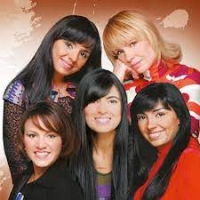
Voices was a female supergroup of contemporary Christian music. Founded in 1997, the group was formed by five singers already known in the evangelical environment, which were Marina de Oliveira, Fernanda Brum, Liz Lanne, Eyshila and Jozyanne. The supergroup was expected to last a short time. However, the band remained active for several years.
Lineu Soares
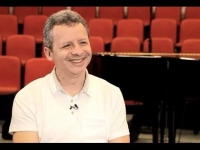
Lineu Soares in Piano from the São Judas Tadeu University (1988) and master in Music from the State University of Campinas (2012). He is currently a University Professor at the Adventist University Center of São Paulo.
Jakob Dont
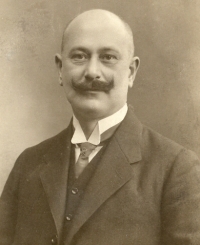
Jakob Dont was an Austria violinist, composer, and teacher. He was born and died in Vienna. His father Valentin Dont was a noted cellist. Jakob was a student of Josef Böhm and of Georg Hellmesberger.
Stephen Schwartz
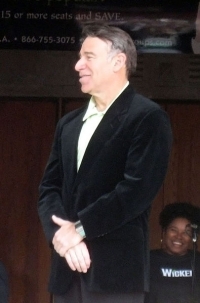
Stephen Lawrence Schwartz (born March 6, 1948) is an American musical theater lyricist and composer. In a career already spanning over four decades, Schwartz has written such hit musicals as Godspell (1971), Pippin (1972) and Wicked (2003). He has also contributed lyrics for a number of successful films, including Pocahontas (1995), The Hunchback of Notre Dame (1996), The Prince of Egypt (1998; music and lyrics) and Enchanted (2007). Schwartz has won the Drama Desk Award for Outstanding Lyrics, three Grammy Awards, and three Academy Awards and has been nominated for six Tony Awards.
Schubert

Franz Peter Schubert (January 31, 1797 – November 19, 1828) was an Austrian composer. He wrote some 600 lieder, nine symphonies (including the famous "Unfinished Symphony"), liturgical music, operas, and a large body of chamber and solo piano music. He is particularly noted for his original melodic and harmonic writing.
While Schubert had a close circle of friends and associates who admired his work (including his teacher Antonio Salieri, and the prominent singer Johann Michael Vogl), wider appreciation of his music during his lifetime was limited at best. He was never able to secure adequate permanent employment, and for most of his career he relied on the support of friends and family. Interest in Schubert's work increased dramatically in the decades following his death and he is now widely considered to be one of the greatest composers in the Western tradition.
While he was clearly influenced by the Classical sonata forms of Beethoven and Mozart (his early works, among them notably the 5th Symphony, are particularly Mozartean), his formal structures and his developments tend to give the impression more of melodic development than of harmonic drama. This combination of Classical form and long-breathed Romantic melody sometimes lends them a discursive style: his 9th Symphony was described by Robert Schumann as running to "heavenly lengths". His harmonic innovations include movements in which the first section ends in the key of the subdominant rather than the dominant (as in the last movement of the Trout Quintet). Schubert's practice here was a forerunner of the common Romantic technique of relaxing, rather than raising, tension in the middle of a movement, with final resolution postponed to the very end.
While Schubert had a close circle of friends and associates who admired his work (including his teacher Antonio Salieri, and the prominent singer Johann Michael Vogl), wider appreciation of his music during his lifetime was limited at best. He was never able to secure adequate permanent employment, and for most of his career he relied on the support of friends and family. Interest in Schubert's work increased dramatically in the decades following his death and he is now widely considered to be one of the greatest composers in the Western tradition.
While he was clearly influenced by the Classical sonata forms of Beethoven and Mozart (his early works, among them notably the 5th Symphony, are particularly Mozartean), his formal structures and his developments tend to give the impression more of melodic development than of harmonic drama. This combination of Classical form and long-breathed Romantic melody sometimes lends them a discursive style: his 9th Symphony was described by Robert Schumann as running to "heavenly lengths". His harmonic innovations include movements in which the first section ends in the key of the subdominant rather than the dominant (as in the last movement of the Trout Quintet). Schubert's practice here was a forerunner of the common Romantic technique of relaxing, rather than raising, tension in the middle of a movement, with final resolution postponed to the very end.
Paul De Senneville

Paul de Senneville, a French songwriter and music producer.
As a director of a record company, Disc AZ, he started a new career on the basis of his passion in life: music.
After writing his first song in 1962, he contributed music for songs in many movie soundtracks produced by French companies such as Univers Galaxie and Daber Films. In 1968, while managing Michel Polnareff's career, he met Olivier Toussaint, forming a successful songwriting partnership. with songs were recorded by major French artists such as: Mireille Mathieu, Michèle Torr, Christophe, Hervé Vilard, Dalida, Petula Clark and Claude François. This partnership accounts for over 100 million records sold internationally. Partnering with lyricist Jean-Loup Dabadie, he wrote Tous les bateaux, tous les oiseaux, a French hit recorded by Michel Polnareff.
Very soon, they also got involved in Production business. They started up the group Pop Concerto Orchestra. which Olivier Toussaint sang as a lead singer there. Soon after, they launched their second group Anarchic System that produced Rock & roll music. Over a period of 5 years, both groups sold several millions of records.
As a director of a record company, Disc AZ, he started a new career on the basis of his passion in life: music.
After writing his first song in 1962, he contributed music for songs in many movie soundtracks produced by French companies such as Univers Galaxie and Daber Films. In 1968, while managing Michel Polnareff's career, he met Olivier Toussaint, forming a successful songwriting partnership. with songs were recorded by major French artists such as: Mireille Mathieu, Michèle Torr, Christophe, Hervé Vilard, Dalida, Petula Clark and Claude François. This partnership accounts for over 100 million records sold internationally. Partnering with lyricist Jean-Loup Dabadie, he wrote Tous les bateaux, tous les oiseaux, a French hit recorded by Michel Polnareff.
Very soon, they also got involved in Production business. They started up the group Pop Concerto Orchestra. which Olivier Toussaint sang as a lead singer there. Soon after, they launched their second group Anarchic System that produced Rock & roll music. Over a period of 5 years, both groups sold several millions of records.
José Vieira Brandão
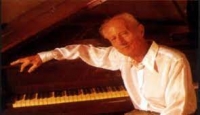
José Vieira Brandão (Cambuquira, 26 de setembro de 1911 - Rio de Janeiro, 27 de julho de 2002) foi um compositor, pianista, regente coral e professor brasileiro. Destacou-se como intérprete da obra pianística de Villa-Lobos e por sua obra coral. Compôs também para piano, canto e piano, violão, e instrumentos de corda e de sopro.
Yuki Kajiura

Yuki Kajiura (梶浦 由記 Kajiura Yuki?, born August 6, 1965 in Tokyo, Japan) is a Japanese composer and music producer. She has provided the music for several popular anime series, such as the final Kimagure Orange Road movie, Noir, .hack//Sign, Aquarian Age, Madlax, My-HiME, My-Otome, .hack//Roots, Pandora Hearts, Puella Magi Madoka Magica, Sword Art Online, Tsubasa Chronicle and the Kara no Kyoukai movies (amongst others). She also assisted Toshihiko Sahashi with Mobile Suit Gundam SEED and Mobile Suit Gundam SEED Destiny. Kajiura has also composed for video games, including the cutscene music for Xenosaga II and the entire Xenosaga III game soundtrack.
Antonin Dvorak

Antonín Leopold Dvořák (English pronunciation: /ˈdvɒrʒɑːk/ DVOR-zhahk or /ˈdvɒrʒæk/ DVOR-zhak; Czech: ( listen); September 8, 1841 – May 1, 1904) was a Czech composer of Romantic music, who employed the idioms of the folk music of Moravia and his native Bohemia. His works include operas, symphonic, choral and chamber music. His best-known works include his New World Symphony, the Slavonic Dances, "American" String Quartet, and Cello Concerto in B minor.
Dvořák wrote in a variety of forms: his nine symphonies generally stick to classical models that Beethoven would have recognised, but he also worked in the newly developed symphonic poem form and the influence of Richard Wagner is apparent in some works. Many of his works also show the influence of Czech folk music, both in terms of rhythms and melodic shapes; perhaps the best known examples are the two sets of Slavonic Dances. Dvořák also wrote operas (of which the best known is Rusalka); serenades for string orchestra and wind ensemble; chamber music (including a number of string quartets, and quintets); songs; choral music; and piano music.
Dvořák wrote in a variety of forms: his nine symphonies generally stick to classical models that Beethoven would have recognised, but he also worked in the newly developed symphonic poem form and the influence of Richard Wagner is apparent in some works. Many of his works also show the influence of Czech folk music, both in terms of rhythms and melodic shapes; perhaps the best known examples are the two sets of Slavonic Dances. Dvořák also wrote operas (of which the best known is Rusalka); serenades for string orchestra and wind ensemble; chamber music (including a number of string quartets, and quintets); songs; choral music; and piano music.
Hill
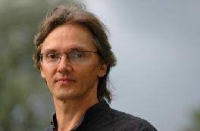
Frank Hill (* 25. November 1957 in Rostock) ist ein deutscher Komponist und Gitarrist.Die väterliche Familie steht in musischer Tradition, seit 1700 sind Berufsmusiker verzeichnet. Hill trat als Sechsjähriger in das Konservatorium Rostock ein, begann seine Studienzeit 1978 mit Medizin an der Rostocker Universität und schloss 1986 an der Hochschule für Musik „Franz Liszt“ in Weimar ab. Danach lebte er bis 2014 in Berlin, heute naturnah bei Berlin.
Tyler Versluis
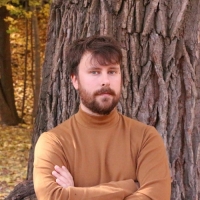
Tyler Versluis is an Ontario-based composer and conductor. His music has been commissioned and performed by a growing list of Canadian ensembles and organizations, including the Winnipeg Symphony Orchestra, Soundstreams, ARRAYmusic, Caution Tape Sound Collective, the Toy Piano Composers, and VIVA! Youth Singers of Toronto. His music is also performed internationally, with premières and repeat performances in the USA, France, the Netherlands, Poland, Slovakia and Lithuania.
Jesper Eg Pedersen
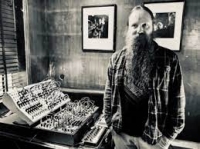
Composer, sound artist, performer and educator residing in Reykjavik Iceland. He's made music for various musicians and ensembles that in term have ...
Jason Tolioli
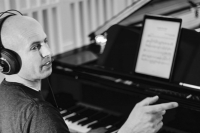
Jason is an American pianist, composer, and entrepreneur. Classically trained in piano growing up, he began creating his own arrangements
Franz Schubert

Franz Peter Schubert (German pronunciation: ; January 31, 1797 – November 19, 1828) was an Austrian composer. He wrote some 600 Lieder, nine symphonies (including the famous "Unfinished Symphony"), liturgical music, operas, some incidental music, and a large body of chamber and solo piano music. He is particularly noted for his original melodic and harmonic writing.
Schubert was born into a musical family, and received formal musical training through much of his childhood. While Schubert had a close circle of friends and associates who admired his work (amongst them the prominent singer Johann Michael Vogl), wide appreciation of his music during his lifetime was limited at best. He was never able to secure adequate permanent employment, and for most of his career he relied on the support of friends and family. He made some money from published works, and occasionally gave private musical instruction. In the last year of his life he began to receive wider acclaim. He died at the age of 31 of "typhoid fever", a diagnosis which was vague at the time; several scholars suspect the real illness was tertiary syphilis.
Interest in Schubert's work increased dramatically in the decades following his death. Composers like Franz Liszt, Robert Schumann and Felix Mendelssohn discovered, collected, and championed his works in the 19th century, as did musicologist Sir George Grove. Franz Schubert is now widely considered to be one of the greatest composers in the Western tradition.
Schubert was born into a musical family, and received formal musical training through much of his childhood. While Schubert had a close circle of friends and associates who admired his work (amongst them the prominent singer Johann Michael Vogl), wide appreciation of his music during his lifetime was limited at best. He was never able to secure adequate permanent employment, and for most of his career he relied on the support of friends and family. He made some money from published works, and occasionally gave private musical instruction. In the last year of his life he began to receive wider acclaim. He died at the age of 31 of "typhoid fever", a diagnosis which was vague at the time; several scholars suspect the real illness was tertiary syphilis.
Interest in Schubert's work increased dramatically in the decades following his death. Composers like Franz Liszt, Robert Schumann and Felix Mendelssohn discovered, collected, and championed his works in the 19th century, as did musicologist Sir George Grove. Franz Schubert is now widely considered to be one of the greatest composers in the Western tradition.
Josh Groban
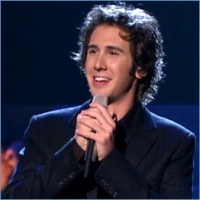
Joshua Winslow Groban (born February 27, 1981) is a Grammy-nominated American singer-songwriter. He has concentrated his career so far mostly in concert singing and recordings, although he has stated that he wishes to pursue musical theater in the future.
Various music critics have described Groban's voice in different ways, with some referring to him as a tenor and others as a baritone. In performance, Groban's music goes as low as G2 (as in the song "To Where You Are") and extends up to at least B4 flat or the B flat above middle C (as heard in "You Raise Me Up"). He also hits a High B during the Baywatch theme song in his Emmy performance of TV Theme Songs on September 21, 2008.This places his voice lower than the tenor range on the low end, and just short of Tenor C, and therefore above the baritone range, on the high end.
Some of Groban's musical influences have been Radiohead, Paul Simon, Sting, Peter Gabriel, and Björk. He says he is able to look up to anyone, musically, who has pushed the boundaries and stepped outside of the box. As for vocal influences, "anyone who told a story with their songs," including Mandy Patinkin, Klaus Nomi, George Hearn, and Luciano Pavarotti.
Various music critics have described Groban's voice in different ways, with some referring to him as a tenor and others as a baritone. In performance, Groban's music goes as low as G2 (as in the song "To Where You Are") and extends up to at least B4 flat or the B flat above middle C (as heard in "You Raise Me Up"). He also hits a High B during the Baywatch theme song in his Emmy performance of TV Theme Songs on September 21, 2008.This places his voice lower than the tenor range on the low end, and just short of Tenor C, and therefore above the baritone range, on the high end.
Some of Groban's musical influences have been Radiohead, Paul Simon, Sting, Peter Gabriel, and Björk. He says he is able to look up to anyone, musically, who has pushed the boundaries and stepped outside of the box. As for vocal influences, "anyone who told a story with their songs," including Mandy Patinkin, Klaus Nomi, George Hearn, and Luciano Pavarotti.
Chopin

Frédéric Chopin (1 March 1810 – 17 October 1849) was a Polish composer and virtuoso pianist of the Romantic period. He is widely regarded as the greatest Polish composer, and ranks as one of music's greatest tone poets.
He was born in the village of Żelazowa Wola, in the Duchy of Warsaw, to a Polish mother and French-expatriate father, and in his early life was regarded as a child-prodigy pianist. In November 1830, at the age of 20, Chopin went abroad; following the suppression of the Polish November Uprising of 1830–31, he became one of many expatriates of the Polish "Great Emigration."
In Paris, he made a comfortable living as a composer and piano teacher, while giving few public performances. A Polish patriot,
Chopin's extant compositions were written primarily for the piano as a solo instrument. Though technically demanding, Chopin's style emphasizes nuance and expressive depth rather than virtuosity. Chopin invented musical forms such as the ballade and was responsible for major innovations in forms such as the piano sonata, waltz, nocturne, étude, impromptu and prelude. His works are mainstays of Romanticism in 19th-century classical music.
He was born in the village of Żelazowa Wola, in the Duchy of Warsaw, to a Polish mother and French-expatriate father, and in his early life was regarded as a child-prodigy pianist. In November 1830, at the age of 20, Chopin went abroad; following the suppression of the Polish November Uprising of 1830–31, he became one of many expatriates of the Polish "Great Emigration."
In Paris, he made a comfortable living as a composer and piano teacher, while giving few public performances. A Polish patriot,
Chopin's extant compositions were written primarily for the piano as a solo instrument. Though technically demanding, Chopin's style emphasizes nuance and expressive depth rather than virtuosity. Chopin invented musical forms such as the ballade and was responsible for major innovations in forms such as the piano sonata, waltz, nocturne, étude, impromptu and prelude. His works are mainstays of Romanticism in 19th-century classical music.
Tina Turner
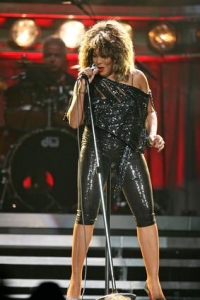
Tina Turner (born Anna Mae Bullock; November 26, 1939) is an American singer and actress whose career has spanned more than 50 years. She has won numerous awards and her achievements in the rock music genre have earned her the title "The Queen of Rock 'n' Roll". Turner started out her music career with husband Ike Turner as a member of the Ike & Tina Turner Revue. Success followed with a string of hits including "River Deep, Mountain High" and the 1971 hit "Proud Mary". Allegations of spousal abuse following her split with Turner in 1977 arose with the publication of her autobiography I, Tina. Turner rebuilt her career, launching a string of hits beginning in 1983 with "Let's Stay Together" and the 1984 release of her album Private Dancer.
Her musical career led to film roles, beginning with a prominent role as The Acid Queen in the 1975 film Tommy, and an appearance in Sgt. Pepper's Lonely Hearts Club Band. She starred opposite Mel Gibson as Aunty Entity in Mad Max Beyond Thunderdome for which she received the NAACP Image Award for Outstanding Actress in a Motion Picture, and her version of the film's theme, "We Don't Need Another Hero", was a hit single. She appeared in the 1993 film Last Action Hero.
One of the world's most popular entertainers, Turner has been called the most successful female rock artist and was named "one of the greatest singers of all time" by Rolling Stone. Her records have sold nearly 200 million copies worldwide. She has sold more concert tickets than any other solo music performer in history. She is known for her energetic stage presence, powerful vocals, career longevity, and widespread appeal. In 2008, Turner left semi-retirement to embark on her Tina!: 50th Anniversary Tour. Turner's tour has become one of the highest selling ticketed shows of 2008-2009.
Her musical career led to film roles, beginning with a prominent role as The Acid Queen in the 1975 film Tommy, and an appearance in Sgt. Pepper's Lonely Hearts Club Band. She starred opposite Mel Gibson as Aunty Entity in Mad Max Beyond Thunderdome for which she received the NAACP Image Award for Outstanding Actress in a Motion Picture, and her version of the film's theme, "We Don't Need Another Hero", was a hit single. She appeared in the 1993 film Last Action Hero.
One of the world's most popular entertainers, Turner has been called the most successful female rock artist and was named "one of the greatest singers of all time" by Rolling Stone. Her records have sold nearly 200 million copies worldwide. She has sold more concert tickets than any other solo music performer in history. She is known for her energetic stage presence, powerful vocals, career longevity, and widespread appeal. In 2008, Turner left semi-retirement to embark on her Tina!: 50th Anniversary Tour. Turner's tour has become one of the highest selling ticketed shows of 2008-2009.
Koji Kondo

Koji Kondo (近藤浩治 Kondō Kōji?, born August 13, 1960) is a Japanese video game composer and sound director who has been employed at Nintendo since 1984. He is best known for scoring numerous titles in the Mario and The Legend of Zelda series.
Andrew Lloyd Webber

Andrew Lloyd Webber, Baron Lloyd-Webber (born 22 March 1948) is an English composer of musical theatre, the elder son of organist William Lloyd Webber and brother of the cellist Julian Lloyd Webber. Lloyd Webber started composing at the age of six, and published his first piece at the age of nine.
Lloyd Webber has achieved great popular success, with several musicals that have run for more than a decade both in the West End and on Broadway. He has composed 13 musicals, a song cycle, a set of variations, two film scores, and a Latin Requiem Mass. He has also gained a number of honours, including a knighthood in 1992, followed by a peerage from the British Government for services to Music, seven Tony Awards (and 40 nominations), three Grammy Awards (with an additional 60 nominations), an Academy Award (two other nominations), seven Olivier Awards (with 100 nominations), a Golden Globe, and the Kennedy Center Honors in 2006. Several of his songs, notably "The Music of the Night" from The Phantom of the Opera, "I Don't Know How to Love Him" from Jesus Christ Superstar, "Don't Cry for Me, Argentina" from Evita, "Any Dream Will Do" from Joseph and the Amazing Technicolor Dreamcoat and "Memory" from Cats have been widely recorded and were hits outside of their parent musicals. His company, the Really Useful Group, is one of the largest theatre operators in London.
Producers in several parts of the UK have staged productions, including national tours, of Lloyd Webber's musicals under licence from the Really Useful Group. According to britishhitsongwriters.com, he is the one hundredth most successful songwriter in U.K. singles chart history, based on weeks that his compositions have spent on the chart.
Lloyd Webber has achieved great popular success, with several musicals that have run for more than a decade both in the West End and on Broadway. He has composed 13 musicals, a song cycle, a set of variations, two film scores, and a Latin Requiem Mass. He has also gained a number of honours, including a knighthood in 1992, followed by a peerage from the British Government for services to Music, seven Tony Awards (and 40 nominations), three Grammy Awards (with an additional 60 nominations), an Academy Award (two other nominations), seven Olivier Awards (with 100 nominations), a Golden Globe, and the Kennedy Center Honors in 2006. Several of his songs, notably "The Music of the Night" from The Phantom of the Opera, "I Don't Know How to Love Him" from Jesus Christ Superstar, "Don't Cry for Me, Argentina" from Evita, "Any Dream Will Do" from Joseph and the Amazing Technicolor Dreamcoat and "Memory" from Cats have been widely recorded and were hits outside of their parent musicals. His company, the Really Useful Group, is one of the largest theatre operators in London.
Producers in several parts of the UK have staged productions, including national tours, of Lloyd Webber's musicals under licence from the Really Useful Group. According to britishhitsongwriters.com, he is the one hundredth most successful songwriter in U.K. singles chart history, based on weeks that his compositions have spent on the chart.
Julius Fučík

Julius Ernest Wilhelm Fučík (Czech: ; 18 July 1872 – 25 September 1916) was a Czech composer and conductor of military bands. He became a prolific composer, with over 400 marches, polkas, and waltzes to his name. As most of his work were for military bands, he is sometimes known as the "Bohemian Sousa".Today his marches are still played as patriotic music in the Czech Republic. His worldwide reputation rests primarily on two works: "The Florentiner March", popular throughout much of Europe, and the "Entrance of the Gladiators" (Vjezd gladiátorů), which is widely recognized, often under the title "Thunder and Blazes", as one of the most popular theme tunes for circus clowns.
Ademir Junior

Featured in Brazilian instrumental music and master of improvisation, the multi-instrumentalist, arranger and composer Ademir Junior is among the best saxophonists today.At age 7 he started his musical journey with solfeggio lessons with his father, but serious studies began at age 10 when he joined the SESI Band in Ceilândia. With just over 2 months on the clarinet, Juninho was already performing with the band. In that same year, he became the soloist of the SESI Band and the little prodigy made his first recording in a work by singer Oswaldo Montenegro.
Woodie Guthrie

Woodrow Wilson Guthrie was an American singer-songwriter and one of the most significant figures in American folk music. His work focused on themes of American socialism and anti-fascism.
Pierre Rode
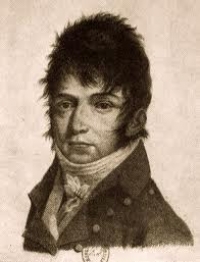
Jacques Pierre Joseph Rode (16 February 1774 – 25 November 1830) was a French violinist and composer.
Born in Bordeaux, Aquitaine, France, Pierre Rode traveled to Paris at the age of 13 and soon became a favourite pupil of the great Giovanni Battista Viotti who found the boy so talented that he charged him no fee for the lessons. Rode inherited his teacher's style to which he added more mildness and a more refined tone. It is also recorded that he made extensive use of portamento. He collaborated with Baillot and Kreutzer on the official Violin Method of the Conservatoire of Paris, published in 1802.
Rode served as violin soloist to Napoleon I of France and toured extensively in the Netherlands, Germany, England and Spain, staying with François-Adrien Boïeldieu in Saint Petersburg for 1804-1809, and later spending much time in Moscow. Ludwig van Beethoven wrote his last violin sonata (opus 96) for Rode when the violinist was visiting Vienna. He also performed chamber music, but the backbone of his repertoire was formed by Viotti's concertos which served as models for his own concertos. These, as well as the 24 Caprices (which have been recorded by Oscar Shumsky), were written during 1814-1819 when he lived in Berlin.
Born in Bordeaux, Aquitaine, France, Pierre Rode traveled to Paris at the age of 13 and soon became a favourite pupil of the great Giovanni Battista Viotti who found the boy so talented that he charged him no fee for the lessons. Rode inherited his teacher's style to which he added more mildness and a more refined tone. It is also recorded that he made extensive use of portamento. He collaborated with Baillot and Kreutzer on the official Violin Method of the Conservatoire of Paris, published in 1802.
Rode served as violin soloist to Napoleon I of France and toured extensively in the Netherlands, Germany, England and Spain, staying with François-Adrien Boïeldieu in Saint Petersburg for 1804-1809, and later spending much time in Moscow. Ludwig van Beethoven wrote his last violin sonata (opus 96) for Rode when the violinist was visiting Vienna. He also performed chamber music, but the backbone of his repertoire was formed by Viotti's concertos which served as models for his own concertos. These, as well as the 24 Caprices (which have been recorded by Oscar Shumsky), were written during 1814-1819 when he lived in Berlin.
Scott Joplin

Scott Joplin (between June 1867 and January 1868 – April 1, 1917) was an American musician and composer of ragtime music. He remains the best-known ragtime figure and is regarded as one of the three most important composers of classic ragtime, along with James Scott and Joseph Lamb, and also a precursor to Stride Piano. Decades after his death, his music enjoyed a considerable surge of popularity and critical respect in the 1970s, especially for his most famous composition, "The Entertainer."
Even at the time of publication, Joplin's publisher John Stark was claiming that the rags had obtained classical status, and "lifted ragtime from its low estate and lined it up with Beethoven and Bach".
Even at the time of publication, Joplin's publisher John Stark was claiming that the rags had obtained classical status, and "lifted ragtime from its low estate and lined it up with Beethoven and Bach".
Rachmaninoff

Sergei Vasilievich Rachmaninoff (1 April 1873 - 28 March 1943) was a Russian composer, pianist, and conductor. He was one of the finest pianists of his day and, as a composer, the last great representative of Russian late Romanticism in classical music. Early influences of Tchaikovsky, Rimsky-Korsakov and other Russian composers gave way to a thoroughly personal idiom which included a pronounced lyricism, expressive breadth, structural ingenuity and a tonal palette of rich, distinctive orchestral colors.
Understandably, the piano figures prominently in Rachmaninoff's compositional output, either as a solo instrument or as part of an ensemble. He made it a point, however, to use his own skills as a performer to explore fully the expressive possibilities of the instrument. Even in his earliest works, he revealed a sure grasp of idiomatic piano writing and a striking gift for melody. In some of his early orchestral pieces he showed the first signs of a talent for tone painting, which he would perfect in The Isle of the Dead, and he began to show a similar penchant for vocal writing in two early sets of songs, Opp. 4 and 8. Rachmaninoff's masterpiece, however, is his choral symphony The Bells, in which all of his talents are fused and unified.
Rachmaninoff sometimes felt threatened by the success of modernists such as Scriabin and Prokofiev and wondered whether to cease composing even before he left Russia. His musical philosophy was rooted in the Russian spiritual tradition, where the role of the artist was to create beauty and to speak the truth from the depths of his heart. In his last major interview, in 1941, he admitted his music, like Russian music, was a product of his temperament. He said, on another occasion, "The new kind of music seems to create not from the heart but from the head. Its composers think rather than feel. They have not the capacity to make their works exalt—they meditate, protest, analyze, reason, calculate and brood, but they do not exalt."
Understandably, the piano figures prominently in Rachmaninoff's compositional output, either as a solo instrument or as part of an ensemble. He made it a point, however, to use his own skills as a performer to explore fully the expressive possibilities of the instrument. Even in his earliest works, he revealed a sure grasp of idiomatic piano writing and a striking gift for melody. In some of his early orchestral pieces he showed the first signs of a talent for tone painting, which he would perfect in The Isle of the Dead, and he began to show a similar penchant for vocal writing in two early sets of songs, Opp. 4 and 8. Rachmaninoff's masterpiece, however, is his choral symphony The Bells, in which all of his talents are fused and unified.
Rachmaninoff sometimes felt threatened by the success of modernists such as Scriabin and Prokofiev and wondered whether to cease composing even before he left Russia. His musical philosophy was rooted in the Russian spiritual tradition, where the role of the artist was to create beauty and to speak the truth from the depths of his heart. In his last major interview, in 1941, he admitted his music, like Russian music, was a product of his temperament. He said, on another occasion, "The new kind of music seems to create not from the heart but from the head. Its composers think rather than feel. They have not the capacity to make their works exalt—they meditate, protest, analyze, reason, calculate and brood, but they do not exalt."
Georges Bizet

Georges Bizet (25 October 1838 – 3 June 1875) was a French composer and pianist of the Romantic era. He is best known for the opera Carmen.
Bizet was born at 26 rue de la Tour d'Auvergne in the 9th arrondissement of Paris in 1838. He was registered with the legal name Alexandre César Léopold Bizet, but he was baptised on 16 March 1840 with the first name Georges, and he was always known thereafter as Georges Bizet. His father Adolphe Armand Bizet (1810-86) was an amateur singer and composer, and his mother, Aimée Léopoldine Joséphine née Delsarte (1814-61), was the sister of the famous singing teacher François Delsarte.
He entered the Paris Conservatory of Music on 9 October 1848, a fortnight before his tenth birthday. His teachers there were Pierre Zimmermann (fugue and counterpoint; often assisted by his son-in-law Charles Gounod), Antoine François Marmontel (piano), François Benoist (organ) and, on Zimmermann's death, Fromental Halévy, whose daughter he himself later married. He won first prizes for organ and fugue in 1855 and completed his earliest compositions.
His first symphony, the Symphony in C, was written in November 1855, when he was seventeen, evidently as a student assignment. It was unknown to the world until 1933, when it was discovered in the archives of the Paris Conservatory library. Upon its first performance in 1935, it was immediately hailed as a junior masterwork and a welcome addition to the early Romantic period repertoire. The symphony bears a stylistic resemblance to the first symphony of Gounod, first played earlier in the same year, and which Bizet had arranged for two pianos although present-day listeners may discern a similarity to music of Franz Schubert, whose work was little known in France at the time the symphony was written.
In 1857, a setting of the one-act operetta Le docteur Miracle won him a share in a prize offered by Jacques Offenbach. He also won the music composition scholarship of the Prix de Rome, the conditions of which required him to study in Rome for three years. There, his talent developed as he wrote such works as the opera buffa Don Procopio (1858-59). There he also composed his only major sacred work, Te Deum (1858), which he submitted to the Prix Rodrigues competition, a contest for Prix de Rome winners only. Bizet failed to win the Prix Rodrigues, and the Te Deum score remained unpublished until 1971. He made two attempts to write another symphony in 1859, but destroyed the manuscripts in December of that year. Apart from this period in Rome, Bizet lived in the Paris area all his life.
Shortly after leaving Rome in July 1860, but while still touring in Italy, he had the idea of writing a symphony in which each of the four movements would be a musical evocation of a different Italian city – Rome, Venice, Florence and Naples. On hearing of his mother's serious illness he cut short his Italian travels and returned to Paris in September 1860; she died a year later. The Scherzo of the symphony was completed by November 1861, but it was not until 1866 that the first version of the whole symphony was written. He subjected it to a number of revisions through to 1871, but died before ever producing what he considered the definitive version. For this reason, the work is sometimes described as "unfinished", but this is an inaccurate description as it was fully scored. It was published in 1880 as the Roma Symphony.
Bizet was born at 26 rue de la Tour d'Auvergne in the 9th arrondissement of Paris in 1838. He was registered with the legal name Alexandre César Léopold Bizet, but he was baptised on 16 March 1840 with the first name Georges, and he was always known thereafter as Georges Bizet. His father Adolphe Armand Bizet (1810-86) was an amateur singer and composer, and his mother, Aimée Léopoldine Joséphine née Delsarte (1814-61), was the sister of the famous singing teacher François Delsarte.
He entered the Paris Conservatory of Music on 9 October 1848, a fortnight before his tenth birthday. His teachers there were Pierre Zimmermann (fugue and counterpoint; often assisted by his son-in-law Charles Gounod), Antoine François Marmontel (piano), François Benoist (organ) and, on Zimmermann's death, Fromental Halévy, whose daughter he himself later married. He won first prizes for organ and fugue in 1855 and completed his earliest compositions.
His first symphony, the Symphony in C, was written in November 1855, when he was seventeen, evidently as a student assignment. It was unknown to the world until 1933, when it was discovered in the archives of the Paris Conservatory library. Upon its first performance in 1935, it was immediately hailed as a junior masterwork and a welcome addition to the early Romantic period repertoire. The symphony bears a stylistic resemblance to the first symphony of Gounod, first played earlier in the same year, and which Bizet had arranged for two pianos although present-day listeners may discern a similarity to music of Franz Schubert, whose work was little known in France at the time the symphony was written.
In 1857, a setting of the one-act operetta Le docteur Miracle won him a share in a prize offered by Jacques Offenbach. He also won the music composition scholarship of the Prix de Rome, the conditions of which required him to study in Rome for three years. There, his talent developed as he wrote such works as the opera buffa Don Procopio (1858-59). There he also composed his only major sacred work, Te Deum (1858), which he submitted to the Prix Rodrigues competition, a contest for Prix de Rome winners only. Bizet failed to win the Prix Rodrigues, and the Te Deum score remained unpublished until 1971. He made two attempts to write another symphony in 1859, but destroyed the manuscripts in December of that year. Apart from this period in Rome, Bizet lived in the Paris area all his life.
Shortly after leaving Rome in July 1860, but while still touring in Italy, he had the idea of writing a symphony in which each of the four movements would be a musical evocation of a different Italian city – Rome, Venice, Florence and Naples. On hearing of his mother's serious illness he cut short his Italian travels and returned to Paris in September 1860; she died a year later. The Scherzo of the symphony was completed by November 1861, but it was not until 1866 that the first version of the whole symphony was written. He subjected it to a number of revisions through to 1871, but died before ever producing what he considered the definitive version. For this reason, the work is sometimes described as "unfinished", but this is an inaccurate description as it was fully scored. It was published in 1880 as the Roma Symphony.
Zequinha de Abreu

José Gomes de Abreu, better known as Zequinha de Abreu (September 19, 1880 — January 22, 1935), was a Brazilian musician and composer who in 1917 wrote the famous choro tune "Tico-Tico no Fubá" (whose original title was "Tico-Tico no Farelo"). Other well-known tunes he wrote were "Branca" and "Tardes de Lindóia."
Chucho Valdés

Jesús Valdés Rodríguez, better known as Chucho Valdés (born October 9, 1941), is a Cuban pianist, bandleader, composer and arranger whose career spans over 50 years. An original member of the Orquesta Cubana de Música Moderna, in 1973 he founded the group Irakere, one of Cuba's best-known Latin jazz bands. Both his father, Bebo Valdés, and his son, Chuchito, are pianists as well. As a solo artist, he has won four Grammy Awards and three Latin Grammy Awards.
Lucas Allen
Allen Lucas, a classical guitar teacher, arranger and performer here in the Philippines, I study classical
guitar at Philippine Women's University taking up Music Teacher Diploma Major in Classical Guitar. aside
from being a classical guitar teacher and performer, I am also a Music Copyist.
guitar at Philippine Women's University taking up Music Teacher Diploma Major in Classical Guitar. aside
from being a classical guitar teacher and performer, I am also a Music Copyist.
Lena Park

Park Jung-hyun, also known as Lena Park, is an American-born South Korean singer who debuted in 1998 with the album, Piece. She is also widely known in South Korea as her nickname "National fairy" due to her petite body and powerful singing voice.
Brian Tyler

Brian Theodore Tyler (born May 8, 1972) is an American composer, musician, conductor, arranger, and producer, known for his film, television, and video game scores. Tyler scored Transformers: Prime, Eagle Eye, The Expendables trilogy, Iron Man 3, Avengers: Age of Ultron with Danny Elfman, Now You See Me, and Crazy Rich Asians, among others. He also re-arranged the current fanfare of the Universal Pictures logo for its 100th anniversary that was originally composed by Jerry Goldsmith, the 2013–2016 Marvel Studios logo, which debuted with Thor: The Dark World (2013), as well as the NFL Sunday Countdown Theme for ESPN, the Formula One theme (also used in Formula 2 and Formula 3) and five installments of the Fast & Furious franchise. For his work as a film composer, he has won the IFMCA Awards 2014 Composer of the Year.
Snow White and the Seven Dwarfs

Snow White and the Seven Dwarfs is a 1937 American film based on the eponymous European fairy tale by the Brothers Grimm. It was the first full length animated feature to be produced by Walt Disney, and the first American animated feature film in movie history.
Walt Disney's Snow White premiered at the Carthay Circle Theater on December 21, 1937, and the film was released to theaters by RKO Radio Pictures on February 4, 1938. The story was adapted by storyboard artists Dorothy Ann Blank, Richard Creedon, Merrill De Maris, Otto Englander, Earl Hurd, Dick Rickard, Ted Sears and Webb Smith from the German fairy tale Snow White by the Brothers Grimm. David Hand was the supervising director, while William Cottrell, Wilfred Jackson, Larry Morey, Perce Pearce, and Ben Sharpsteen directed the film's individual sequences.
Snow White was one of only two animated films to rank in the American Film Institute's list of the 100 greatest American films of all time in 1997 (the other being Disney's Fantasia), ranking number 49. It achieved a higher ranking (#34) in the list's 2007 update, this time being the only traditionally animated film on the list. The following year AFI would name the film as the the greatest animated film of all time
In 1989, Snow White and the Seven Dwarfs was added to the United States National Film Registry as being deemed "culturally, historically, or aesthetically significant."
Snow White and the Seven Dwarfs, the soundtrack to the 1937 Walt Disney film, was the first commercially issued film soundtrack. It was released in January 1938 as Songs from Walt Disney's Snow White and the Seven Dwarfs (with the Same Characters and Sound Effects as in the Film of That Title) and has since seen numerous expansions and reissues.
Walt Disney's Snow White premiered at the Carthay Circle Theater on December 21, 1937, and the film was released to theaters by RKO Radio Pictures on February 4, 1938. The story was adapted by storyboard artists Dorothy Ann Blank, Richard Creedon, Merrill De Maris, Otto Englander, Earl Hurd, Dick Rickard, Ted Sears and Webb Smith from the German fairy tale Snow White by the Brothers Grimm. David Hand was the supervising director, while William Cottrell, Wilfred Jackson, Larry Morey, Perce Pearce, and Ben Sharpsteen directed the film's individual sequences.
Snow White was one of only two animated films to rank in the American Film Institute's list of the 100 greatest American films of all time in 1997 (the other being Disney's Fantasia), ranking number 49. It achieved a higher ranking (#34) in the list's 2007 update, this time being the only traditionally animated film on the list. The following year AFI would name the film as the the greatest animated film of all time
In 1989, Snow White and the Seven Dwarfs was added to the United States National Film Registry as being deemed "culturally, historically, or aesthetically significant."
Snow White and the Seven Dwarfs, the soundtrack to the 1937 Walt Disney film, was the first commercially issued film soundtrack. It was released in January 1938 as Songs from Walt Disney's Snow White and the Seven Dwarfs (with the Same Characters and Sound Effects as in the Film of That Title) and has since seen numerous expansions and reissues.
Ottorino Respighi
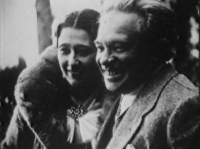
Ottorino Respighi (July 9, 1879, Bologna - April 18, 1936) was an Italian composer, musicologist and conductor. He is best known for his orchestral Roman trilogy: Fontane di Roma - "Fountains of Rome"; Pini di Roma - "Pines of Rome"; and Feste Romane - "Roman Festivals". His musicological interest in 16th-, 17th- and 18th-century music led him to also compose pieces based on the music of this period.
Born in Bologna, he studied composition with Giuseppe Martucci and Nikolai Rimsky-Korsakov. Many sources indicate that he also studied briefly with Max Bruch, but in her biography of the composer, Respighi's wife asserts that this is not the case. Principally a violinist until 1908, he then turned primarily to composition. He lived in Rome from 1913.
Born in Bologna, he studied composition with Giuseppe Martucci and Nikolai Rimsky-Korsakov. Many sources indicate that he also studied briefly with Max Bruch, but in her biography of the composer, Respighi's wife asserts that this is not the case. Principally a violinist until 1908, he then turned primarily to composition. He lived in Rome from 1913.
Astor Piazzolla

Ástor Pantaleón Piazzolla (March 11, 1921 – July 4, 1992) was an Argentine tango composer and bandoneón player. His oeuvre revolutionized the traditional tango into a new style termed nuevo tango, incorporating elements from jazz and classical music. An excellent bandoneonist, he regularly performed his own compositions with different ensembles.
Piazzolla's nuevo tango was distinct from the traditional tango in its incorporation of elements of jazz, its use of extended harmonies and dissonance, its use of counterpoint, and its ventures into extended compositional forms. As Argentine psychoanalyst Carlos Kuri has pointed out, Piazzolla's fusion of tango with this wide range of other recognizable Western musical elements was so successful that it produced a new individual style transcending these influences. It is precisely this success, and individuality, that makes it hard to pin down where particular influences reside in his compositions, but some aspects are clear. The use of the passacaglia technique of a circulating bass line and harmonic sequence, invented and much used in 17th and 18th century baroque music but also central to the idea of jazz "changes", predominates in most of Piazzolla's mature compositions. Another clear reference to the baroque is the often complex and virtuosic counterpoint that sometimes follows strict fugal behavior but more often simply allows each performer in the group to assert his voice. A further technique that emphasises this sense of democracy and freedom among the musicians is improvisation that is borrowed from jazz in concept, but in practice involves a different vocabulary of scales and rhythms that stay within the parameters of the established tango sound-world. Pablo Ziegler has been particularly responsible for developing this aspect of the style both within Piazzolla's groups and since the composer's death.
Piazzolla's nuevo tango was distinct from the traditional tango in its incorporation of elements of jazz, its use of extended harmonies and dissonance, its use of counterpoint, and its ventures into extended compositional forms. As Argentine psychoanalyst Carlos Kuri has pointed out, Piazzolla's fusion of tango with this wide range of other recognizable Western musical elements was so successful that it produced a new individual style transcending these influences. It is precisely this success, and individuality, that makes it hard to pin down where particular influences reside in his compositions, but some aspects are clear. The use of the passacaglia technique of a circulating bass line and harmonic sequence, invented and much used in 17th and 18th century baroque music but also central to the idea of jazz "changes", predominates in most of Piazzolla's mature compositions. Another clear reference to the baroque is the often complex and virtuosic counterpoint that sometimes follows strict fugal behavior but more often simply allows each performer in the group to assert his voice. A further technique that emphasises this sense of democracy and freedom among the musicians is improvisation that is borrowed from jazz in concept, but in practice involves a different vocabulary of scales and rhythms that stay within the parameters of the established tango sound-world. Pablo Ziegler has been particularly responsible for developing this aspect of the style both within Piazzolla's groups and since the composer's death.
Paganini

Niccolò Paganini (27 October 1782 – 27 May 1840) was an Italian violinist, violist, guitarist, and composer. He was one of the most celebrated violin virtuosi of his time, and left his mark as one of the pillars of modern violin technique. His caprice in A minor, Op. 1 No. 24 is among his best known of compositions, and serves as inspiration for many prominent artists.
Paganini composed his own works to play exclusively in his concerts, all of which had profound influences on the evolution of violin techniques. His 24 Caprices were probably composed in the period between 1805 to 1809, while he was in the service of the Baciocchi court. Also during this period, he composed the majority of the solo pieces, duo-sonatas,trios and quartets for the guitar. These chamber works may have been inspired by the publication, in Lucca, of the guitar quintets of Boccherini. Many of his variations (and he has become the de facto master of this musical genre), including Le Streghe, The Carnival of Venice, and Nel cor più non mi sento, were composed, or at least first performed, before his European concert tour.
Playbill of Paganini's concert at the Covent Garden in 1832. Note that all solo pieces were of his composition, which was typical of all his concerts.
Generally speaking, Paganini's compositions were technically imaginative, and the timbre of the instrument was greatly expanded as a result of these works. Sounds of different musical instruments and animals were often imitated. One such composition was titled Il Fandango Spanolo (The Spanish Dance), which featured a series of humorous imitations of farm animals. Even more outrageous was a solo piece Duetto Amoroso, in which the sighs and groans of lovers were intimately depicted on the violin. Fortunately there survives a manuscript of the Duetto which has been recorded, while the existence of the Fandango is known only through concert posters.
However, his works were criticized for lacking characteristics of true polyphonism, as pointed out by Eugène Ysaÿe. Yehudi Menuhin, on the other hand, suggested that this might have been the result of his reliance on the guitar (in lieu of the piano) as an aid in composition. The orchestral parts for his concertos were often polite, unadventurous, and clearly supportive of the soloist. In this, his style is consistent with that of other Italian composers such as Paisiello, Rossini and Donizetti, who were influenced by the guitar-song milieu of Naples during this period.
Paganini was also the inspiration of many prominent composers. Both "La Campanella" and the A minor caprice (Nr. 24) have been an object of interest for a number of composers. Franz Liszt, Johannes Brahms, Sergei Rachmaninoff, Boris Blacher, Andrew Lloyd Webber, George Rochberg and Witold Lutosławski, among others, wrote well-known variations on these themes.
Paganini composed his own works to play exclusively in his concerts, all of which had profound influences on the evolution of violin techniques. His 24 Caprices were probably composed in the period between 1805 to 1809, while he was in the service of the Baciocchi court. Also during this period, he composed the majority of the solo pieces, duo-sonatas,trios and quartets for the guitar. These chamber works may have been inspired by the publication, in Lucca, of the guitar quintets of Boccherini. Many of his variations (and he has become the de facto master of this musical genre), including Le Streghe, The Carnival of Venice, and Nel cor più non mi sento, were composed, or at least first performed, before his European concert tour.
Playbill of Paganini's concert at the Covent Garden in 1832. Note that all solo pieces were of his composition, which was typical of all his concerts.
Generally speaking, Paganini's compositions were technically imaginative, and the timbre of the instrument was greatly expanded as a result of these works. Sounds of different musical instruments and animals were often imitated. One such composition was titled Il Fandango Spanolo (The Spanish Dance), which featured a series of humorous imitations of farm animals. Even more outrageous was a solo piece Duetto Amoroso, in which the sighs and groans of lovers were intimately depicted on the violin. Fortunately there survives a manuscript of the Duetto which has been recorded, while the existence of the Fandango is known only through concert posters.
However, his works were criticized for lacking characteristics of true polyphonism, as pointed out by Eugène Ysaÿe. Yehudi Menuhin, on the other hand, suggested that this might have been the result of his reliance on the guitar (in lieu of the piano) as an aid in composition. The orchestral parts for his concertos were often polite, unadventurous, and clearly supportive of the soloist. In this, his style is consistent with that of other Italian composers such as Paisiello, Rossini and Donizetti, who were influenced by the guitar-song milieu of Naples during this period.
Paganini was also the inspiration of many prominent composers. Both "La Campanella" and the A minor caprice (Nr. 24) have been an object of interest for a number of composers. Franz Liszt, Johannes Brahms, Sergei Rachmaninoff, Boris Blacher, Andrew Lloyd Webber, George Rochberg and Witold Lutosławski, among others, wrote well-known variations on these themes.
Pablo de Sarasate

Pablo Martín Melitón de Sarasate y Navascués (10 March 1844 – 20 September 1908) was a Spanish violinist and composer of the Romantic period.
Heinrich Schütz
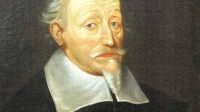
Heinrich Schütz was a German composer and organist, generally regarded as the most important German composer before Johann Sebastian Bach, as well as one of the most important composers of the 17th century.
 Sheet Music 365 is a site for those who wants to access popular sheet music easily,
letting them download the sheet music for free for trial purposes.
It's completely free to download and try the listed sheet music, but you have to delete the files after 24 hours of trial.
Don't forget, if you like the piece of music you have just learned playing,
treat the artist with respect, and go buy the original sheet music.
Sheet Music 365 is a site for those who wants to access popular sheet music easily,
letting them download the sheet music for free for trial purposes.
It's completely free to download and try the listed sheet music, but you have to delete the files after 24 hours of trial.
Don't forget, if you like the piece of music you have just learned playing,
treat the artist with respect, and go buy the original sheet music.
